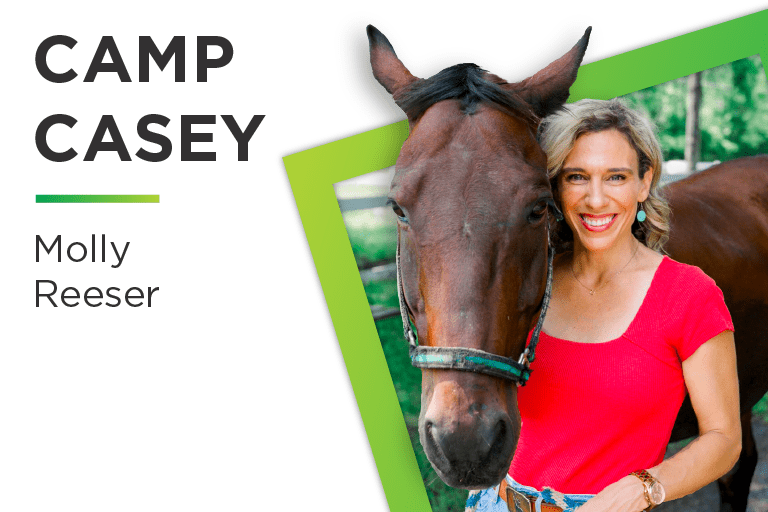Molly Reeser, a 2005 J-School grad, founded the non-profit Camp Casey to provide horseback riding programs to children with cancer, rare blood disorders and other life-threatening illnesses.
As a 19-year-old sophomore in 2002, Molly Reeser saw an advertisement in the State News for a job cleaning horse stalls at a local farm. Reeser had prior experience working at an all-girls horse camp as a camp counselor and horseback riding instructor. She always loved being with horses and felt this would be perfect to help offset her spending as a student.
During Reeser’s time working at the farm in Haslett, she befriended Casey Foote, a 10-year-old girl undergoing chemotherapy for bone and brain cancer. Foote was an avid rider at the farm and instantly became friends with Reeser.
“She was just a really outgoing, outspoken, sarcastic little girl,” Reeser said. “She had a presence about her.”
Foote’s passion was being with the horses. Between her treatments at Sparrow Hospital, she would be at the farm.
Camp Casey
Shortly after her 12th birthday, Foote passed away. Reeser, now a third-year student at MSU, was devastated by the loss. She and others at the farm thought of planting a tree or naming a bench in her memory but concluded that those things could not match the energy and zest for life that Foote exuded.
Reeser then came up with the idea to invite other children from Sparrow Hospital to come to the farm for a day. The farm owners loved the idea, and Reeser ran with it.
“I gathered some friends I met from MSU and charged like $200 worth of pizza and arts and craft supplies on my parents’ emergency credit card,” she recalled.
The day was a success as 80 people — pediatric patients and their caretakers — came out to enjoy the same pleasures of horses and friendship that Casey Foote had once enjoyed. In her honor, the event was named Camp Casey.
Reeser continued organizing “Camp Casey” days at the farm until her graduation in 2005. After graduating with a Journalism degree, Reeser was now at a pivotal moment in her life where she pondered her future.
“I just remember thinking Camp Casey is really the one thing that makes me the happiest.”
After deciding on her direction, Reeser sat down with her parents.
“Listen, I’m going to tell you something that might disappoint you,” she told them. “But I’m not going to go to law school, and I’m not going to get a conventional job. I’m going to be a waitress for a little while, and I’m going to see if I can build Camp Casey into something because I believe it has the potential to turn into something bigger. And more than that, I know this would fulfill me the most.”
Reeser’s parents were concerned that their daughter was taking on this endeavor; this route did not provide the benefits a conventional job offers, like a stable salary, 401K, and health insurance.
Nevertheless, the 23-year-old set out to bring Camp Casey to life.
Horsepower
With limited resources, Reeser launched the Horsey House Calls. Using her now-husband's truck and a trailer, Molly started bringing horses to the homes of children too ill to visit the farm.
During one of the house calls, a patient’s neighbor was curious about Reeser’s operation and decided to meet up with her to learn more. At the meeting, the man and his friend asked, how much it would take to launch this thing forward? She calculated that between buying a truck, trailer, supplies, and insurance, it would be about $50,000— a mere educated guess on the spot.
A few months later, Molly went to her P.O. box and was sifting through her mail when she found an unmarked envelope. Inside was a check for $50,000, which was dated August 26th – Casey’s birthday.
Today, Camp Casey operates on $530,000 annually and serves over 1600 participants every season over its four unique programs: Horsey House Calls, Lone Star Getaways, Outlaw Outings, and Cowboy Camp Outs.
As a nonprofit organization, Camp Casey relies on funding from grants, donations, and events. The annual Camp Casey Gold Rush Gala alone has raised approximately $125,000.
Video: In 2010, four years after Molly Reeser received that unmarked envelope, the Today Show featured Camp Casey’s Horsey House Calls in its morning broadcast.
Reeser credits her unwavering belief in Camp Casey’s mission as one of the reasons for the nonprofit’s success.
“I was really relentless. I just went after it. I believed in the mission so wholeheartedly; I still do,” she said. “Trying to get folks to support this vision has been easy because I believe in it so much. And I’ve seen firsthand the results that it has and the way that this has brought families together, brought communities together and brought volunteers together.”
Reeser recommends taking risks early in your career before you have more responsibilities.
“You can always go back to school. You can always get a nine to five. You can always get the job that is safe. But what you can’t always do is take the risk, and right now is the time to do it.”
—Matt Dwyer
